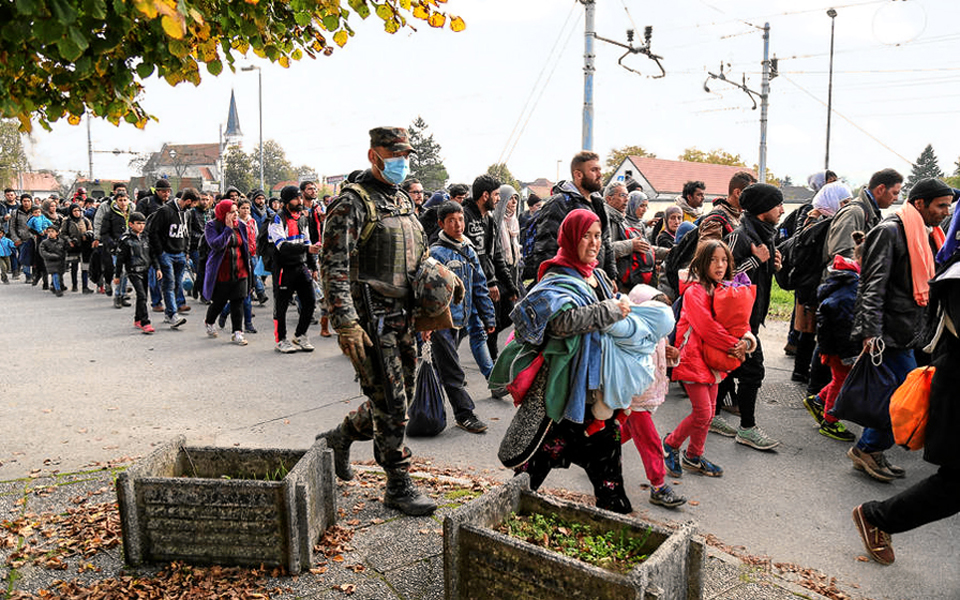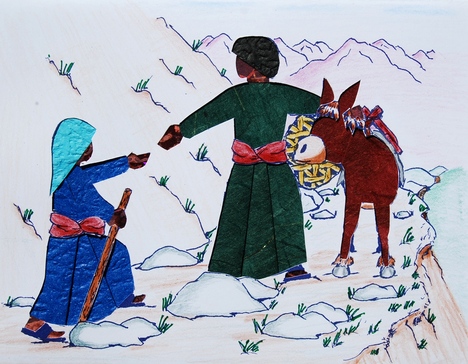An old story that’s always new
An old story that’s always new
A reflection for International Migrants’ Day, 18 December
By Fr Bobby Gilmore

Rest on the Flight into Egypt, Gerard David [Web Gallery of Art]
Joseph rose and took the child and his mother by night and departed for Egypt. He stayed there until the death of Herod. (Mt 2-14-15).
The image of Joseph, Mary and Jesus sitting in the shade of a tree with their donkey tethered to a branch outside some Egyptian town all those years ago is repeated almost daily in newscasts. The plight of Syrian, Iraqi, Libyan and African families fleeing for their lives across water, desert and mountain with a few belongings is reminding us that little has changed for millions of men, women and children. Daily we see the terror in their faces as they scramble aboard rickety boats, reach a Mediterranean beach and then a border crossing secured by military armed with assault rifles.

Syrian refugees passing through Slovenia, 23 October 2015 [Wikipedia]
Worse still is the anxious face of a woman guarding her children as their father is handcuffed by border police in Hungary. The anxiety on her face resembles that of Mary under the tree in Egypt, the Jewish children arriving at Liverpool St. Station waiting to be given a home by an English family, the men, women and children on the St Louis in Havana in 1939, the woman and children on Route 66, the Vietnamese woman and children tossed around in a boat in the Pacific, the woman and children at the US-Mexican border fence, the women and children in a refugee camp in Turkey, Lebanon or Jordan, the woman under a tree in the Sahara, the pregnant woman in the camp at Calais, the father of the dead child on a Greek beach, a woman and children waiting to board a bus in a European railway station, the face of the woman and children at the Migrant Rights Centre in Ireland.
From Aid to the Church in Need
It is hard to accept 2,000 years after the flight of Joseph, Mary and Jesus into Egypt that people are running for their lives from the same part of the world today. But more disturbing is the impotence of present world governance to prevent this from happening. Never are there more resources at the disposal of governments to accommodate desperate people who have to flee. Yet, with some exceptions, the application of these resources is found wanting in responding to basic human shelter and safety.
When it comes to making resources available in preparation for war there seems no shortage or lack of military management. And it is precisely the misuse of these military and associated corporate resources initiating and maintaining war and conflict that are causing the human deprivation we see on the faces of people today. How come that the management expertise evident in military expeditions cannot be used to manage human desperation, the residue of war?
The present exodus from the Middle East and Africa didn’t happen overnight. It was predicted years ago by Susan George in her book, The Debt Boomerang. While great progress has been made over the latter half of the last century and in the early years of this century the care of the weak and the dispossessed has become an irritant. Frequently, tabloid media headlines highlight the weak, immigrants, refugees as swarms of scroungers.
Children document life in largest Syrian refugee camp
They are animalized, corralled in 'jungles' of despair, treated with indifference at the drawbridges of European fortresses. Europe has developed a sanitized memory of its post- and pre-war exodus of people looking for safe havens around the world. Echoes of the pre-Second World War Evian conference are heard around Europe today as nations threaten to close their borders to those seeking refuge.

St Joseph helping Mary on the journey to Bethlehem [ Subanen Crafts]
Immigrants and refugees, just like Joseph, Mary and Jesus, do not want to leave home and familiar surroundings. Television images of destruction in their homelands tell the reason for people’s decisions. World powers vie with each other putting their interests before the needs of populations. German Chancellor Angela Merkel is one exception. She responded recently to criticism for allowing refugees into Germany, ‘If we now have to start apologizing for showing a friendly face in response to emergency situations - then that’s not my country’.
As long as that continues to happen the flight into Egypt is never old, always new. How do we respond as we commemorate that event?
The mystery of salvation has known unpredictable and mysterious integrations of peoples, cultures and races. (Carlo Maria Cardinal Martini SJ, Archbishop of Milan, 1991).
Joseph rose, took the child and his mother, and went to the land of Israel. (Matthew 2:21).
Pope Francis invites 21 Syrian refugees to lunch, August 2016
Columban Fr Bobby Gilmore, ordained in Ireland in 1963, has worked for many years in the Migrant and Refugee Apostolate in Ireland. He spent the early years of his priesthood in Mindanao and Camiguin. From 1978 to 1992 he was Director of the Irish Emigrant Chaplaincy in Britain. And from 1992 until 1999 worked in the Diocese of Montego Bay, Jamaica. After returning to Ireland he established the Migrant Rights Centre Ireland (MRCI).
We Were Refugees
|